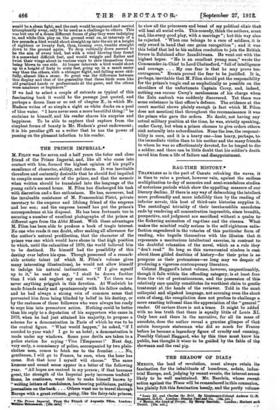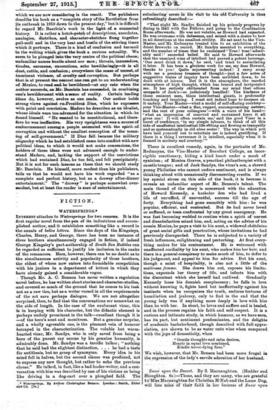THE SHADOW OF DIA.Z.t MEXICO, the land of revolution, must
always retain its fascination for the inhabitants of humdrum, sedate, indus- trial Europe, and, judging by recent events, the interest seemS likely to be well maintained. Mr. Baerlein, whose recent. action against the Times will be remembered in this connexion, has plainly felt this fascination keenly, and the portly volume-
• Louis XL and aeries the Bold. By Lieutenant-Colonel Andrew C.111. .LosulcuL: mania _Easlaad Co. [16z. net. . • .Herbert anal -t Mossiee, tiss Land of Vulva. B1 Xiensw Beterlein. L
which we are now considering is the result. The publishers desofibe his book as a "Complete story of the Rerblution from its outbreak in 1910 down to the present day," but it is difficult to regard Mr. Baerlein's work in the light- of st, connected history. It is rather a hotch.peteb of descriptions, anecdotes, analogies, diatribes, and character:sketches flung together pell-mell and in the very heat and bustle of the stirring times which it portrays. There is a kind of confusion and turmoil in the writing which gives the book a curious actuality. We seem to be plunged into;the very centre of the political chaos; unfamiliar names hustleabout our cars; threats, innuendoes, tirades, sarcasms, - execrations, _echo -bewilderingly-eit is all dust,.rattle, and confusion; everywhere the sense of unrest, of imminent violence, of cruelty and-corruption. But perhaps that is at present the-nearest onecan get to an understanding
Meltico, toreadand.le bewildered---at any rate when the author succeeds, as Mr. Baerlein has succeeded, in combining one's bewilderment with a sense of reality. Certain leading ideas do, however, evolve as one reads. Our author holds strong views against ex.President Diaz, which he expresses with point and conviction. Madero he describes as an idealist, whose ideals were toandvanced for the situation in which he found himsel£ "He wanted to be constitutional, and there- fore he was ineffective. His very uprightness wasa sounee of cmharmsament araonga people saturated with the spirited corruption and without the smallest conception of the mean- ing of self.government." If Diaz fell because the military oligarchy which he had established came into conflict with new political ideas, to which it would not make concessions, the holders of these ideas were not advanced enough to under- stand Madero, and, lacking the support of the convictions which had sustained Diaz, he too fell, and fell precipitately. But it is not for such lessons as these that we should study Mr. Baerlein. He himself, more modest than his publishers, *ells us that he would not have his work regarded "as a complete and perfect history, but as a drowsy after-dinner -entertainment." The " drowsy " is perhaps- somewhat over- modest, but at least the reader is sure of entertainment.











































 Previous page
Previous page